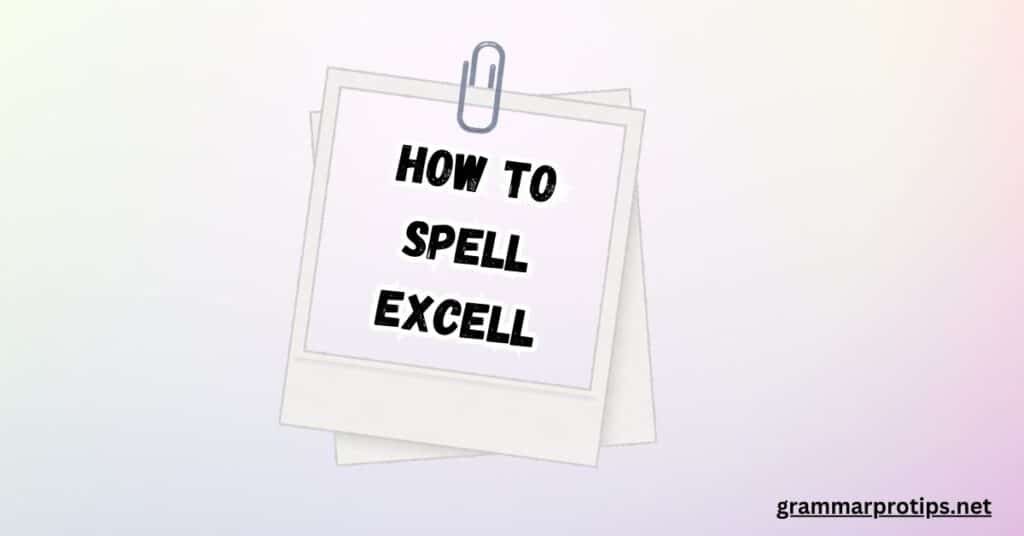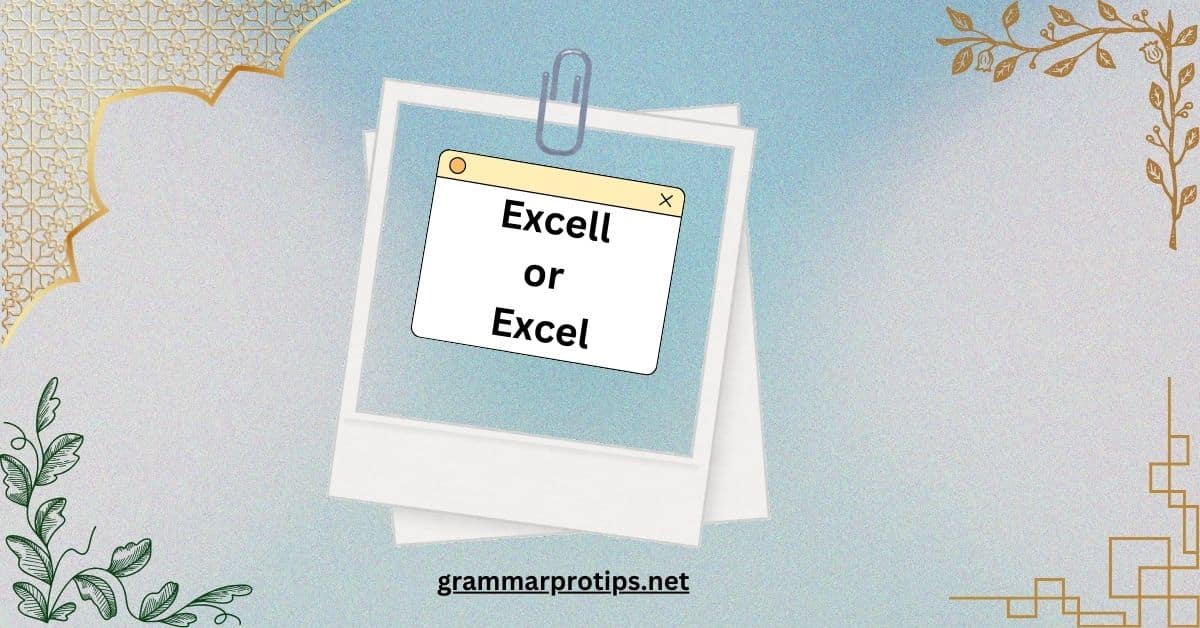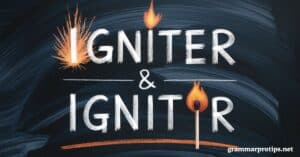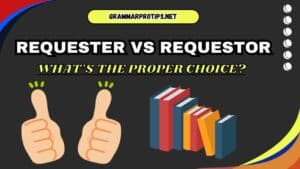The English language is full of nuances and peculiarities that often leave even the most seasoned speakers scratching their heads. One common confusion involves the words “excell” and “excel”. While these two terms might seem interchangeable at first glance, they serve different purposes, and the distinction is crucial in both written and spoken communication.
In this article, we’ll explore the correct spelling of these words, the situations in which they are used, and offer practical examples. By the end, you’ll have a much clearer understanding of “excell” or excel and how to use them effectively.
What Does “Excel” Mean?
Before delving into the specifics of “excell” vs. “excel,” it’s important to understand the meaning of “excel” the word you’ll encounter more frequently in everyday writing.
The verb “excel” means to perform exceptionally well or to outshine others in a particular activity, skill, or field. It’s about surpassing expectations or standards.
For example:
- “I excel at playing chess.”
- “She excels in mathematics.”
When used as a verb, “excel” indicates a level of excellence or mastery over something.
In some cases, “excel” can also function as an adjective in certain contexts, where it describes something of superior quality. For example:
- “He gave an excellent performance in the play.”
It’s often used to describe something that stands out or exceeds expectations, making it clear that it is superior to other alternatives.
What Does “Excell” Mean?
Now, let’s address the word “excell.” If you’ve ever found yourself typing this term or seeing it used in text, you might have wondered, “Is ‘excell’ correct?” Unfortunately, “excell” is not a proper word in standard English.
It’s a common misspelling of “excel,” which is the correct spelling in nearly every context. “Excell” may appear occasionally due to simple typographical errors, but it should be avoided in formal writing.
To highlight the difference, let’s explore some examples of “excell vs. excel.”
Excel vs. Excell: When Should You Use Each?
1. The Correct Verb: “Excel”
When talking about achieving excellence, you should always use the word “excel”—not “excell.”
For instance, if you’re writing an email to a colleague, you might say:
“Dear Sarah,
I hope you’re doing well! I wanted to let you know that I excel in project management and would be happy to assist with any upcoming tasks. Let me know how I can contribute.”
Notice how “excel” fits perfectly as a verb here. It communicates your high level of proficiency in a given area.
2. The Incorrect Usage: “Excell”
Imagine you receive an email from a colleague that reads:
“Dear John,
I believe we need someone who can excell at customer service for this project. Let me know if you have any suggestions.”
In this case, “excell” is a mistake. The correct spelling should be “excel.” Always check your writing for errors like this to ensure you’re using the right form.
3. As an Adjective: “Excel”
“Excel” can also be used as an adjective in the form of “excellent,” which means something of superior quality or achievement.
For example, if you are praising a colleague’s work in an email, you could say:
“Hi Claire,
Your presentation was truly excellent—I was impressed with your ability to convey complex ideas so clearly.”
In this case, “excellent” is the correct word, derived from “excel,” not “excell.”
The Misuse of “Excell”: A Common Typo
In casual writing, especially when typing quickly, it’s easy to accidentally type “excell” instead of “excel.” But, if you take the time to review your work, you’ll catch this simple mistake.
Common Typographical Errors:
- “He excell at his job.” (Should be: “He excels at his job.”)
- “I strive to excell in every task I take on.” (Should be: “I strive to excel in every task I take on.”)
Let’s see how it looks in a longer sentence:
Incorrect: “I excell in life by constantly pushing myself.”
Correct: “I excel in life by constantly pushing myself.”
Now, let’s examine “how to spell excell” in different contexts to further clarify.
How to Spell Excell: A Quick Guide

If you’re unsure about how to spell “excell”, here’s a simple way to remember: “excel” is the correct spelling for any form of the word. Forget “excell”—it doesn’t belong in formal English.
So, if you need to use it in a sentence, always write:
- “I excel at problem-solving.”
- “She excels in her career.”
Excel or Excell Examples?
When comparing “excell or excel examples,” the distinction becomes clear. Here are a few scenarios to help you differentiate:
- Correct Example (using “excel”):
“I always aim to excel at my job by improving my skills.” - Incorrect Example (using “excell”):
“I always aim to excell at my job by improving my skills.” (The correct term here is “excel.”)
In writing, make sure you use “excel” whenever you’re describing someone or something that outperforms others.
Microsoft Excel vs. Excell
Now that we’ve covered the basic distinction between “excell” and excel, let’s move on to the term you’ve likely encountered more often—Microsoft Excel. This is a powerful spreadsheet tool that allows users to organize, analyze, and manipulate data effectively.
For instance, if you’re creating a report for work, you might say:
“I used Microsoft Excel to create the budget spreadsheet for this project.”
In this context, “Microsoft Excel” refers to the software program, and it’s often used in combination with excel formulas to analyze data.
Why Is Microsoft Excel Important?
With its vast capabilities, Microsoft Excel can help you perform complex tasks such as:
- Analyzing data with Excel formulas
- Creating professional-looking Excel spreadsheets
- Organizing financial information or research data
- Visualizing data through graphs and charts
Example Scenario:
Imagine you’re writing a professional email about a project:
Subject: Budget Report for Q1 2025
Dear Mary,
I’ve attached the Microsoft Excel spreadsheet containing the budget for Q1 2025. It includes detailed forecasts and expenditures for the upcoming months. Let me know if you need any further details.
Best regards,
James
This example highlights how Excel plays a crucial role in business tasks and data management.
How to Spell Excelled: Past Tense
One common point of confusion is the past tense of excel. The correct form is “excelled.” This refers to something you did exceptionally well in the past.
For example:
- “She excelled in her exams last year.”
- “John excelled at the competition and won first place.”
If you’re wondering how to spell excelled, remember that the double “l” in “excelled” is crucial.
Excel Online and Excel Spreadsheet
With the advancement of technology, Excel online has become an essential tool for professionals who need access to spreadsheets from any device. Whether you’re working in an office or remotely, the ability to access your Excel spreadsheet through the web makes it easier to collaborate with others.
Example:
“You can access the shared Excel spreadsheet online to track progress and input your data.”
Summary: Excell vs. Excel
To wrap it all up, here’s a quick recap of the most important points:
| Term | Correct or Incorrect | Example |
|---|---|---|
| Excel (verb) | Correct | “I excel at painting.” |
| Excell (verb) | Incorrect | “I excell at painting.” (This is a mistake.) |
| Microsoft Excel | Correct | “I use Microsoft Excel for budgeting.” |
| Excel (adjective) | Correct | “This is an excellent idea.” |
In conclusion, excel is the correct term, whether you’re using it as a verb to describe excellence or as part of Microsoft Excel. Always avoid using “excell,” as it’s simply a misspelling. By understanding these distinctions, you’ll be able to excel in life (pun intended!) and avoid common mistakes in your writing.

Sienna Mauldon is a passionate writer and grammar expert. On her blog, she shares easy-to-follow guides to help readers master grammar rules and improve their writing. With a love for language and teaching, Sienna makes grammar simple and fun for everyone, from beginners to experienced writers.








